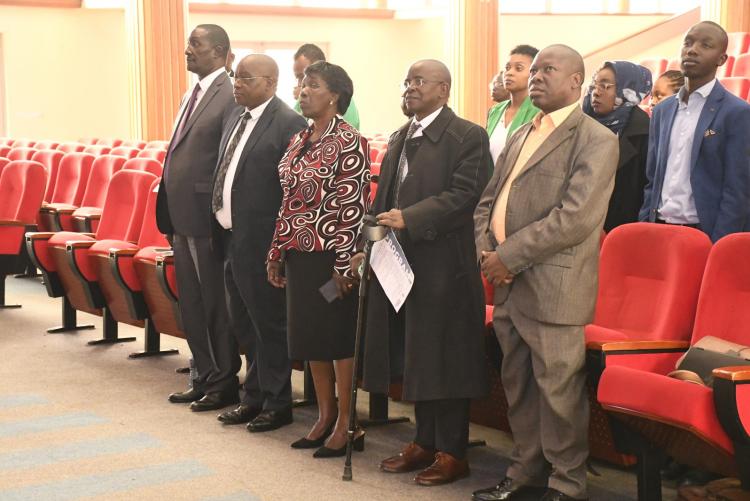Yesterday 8th, 2024, The Centre for Human Rights and Peace (CHRP) based at Faculty of Arts and Social Sciences, launched a significant report titled “Transforming Refugee Policy in Kenya: From Encampment to Socio-Economic Integration.” The event took place at Taifa Hall and was graced by Vice Chancellor Prof. Margaret Hutchison. This collaborative effort involved key partners, including the Kenya National Commission on Human Rights (KNCHR), the Embassy of the Kingdom of the Netherlands (EKN), HAKI NA USHIRIKIANO, and Refugees International. The report aims to promote a progressive shift in refugee policy, focusing on the socio-economic integration of refugees and their communities in Kenya.
In her opening remarks, Prof. Hutchison stated, “Today we gather here to witness yet another important milestone in the history not just for the Centre, but for the University of Nairobi at large. The launch of the report on refugee law is important in many ways. The refugee question is not just a global problem, nor is it merely a regional issue; it is a challenge that we live with as Kenyans. We cannot dismiss the refugee question as merely academic; it poses a threat and presents a fundamental challenge to the enjoyment, protection, and promotion of human rights for the entire international community. This issue concerns us all, and we must speak out—loudly.”
Dr. Bernard Mogesa, CEO of the KNCHR, emphasized the significance of the report, calling for a policy shift that protects refugees’ rights and facilitates their integration into society. He urged collaboration among government, civil society, and international partners to empower refugees and ensure their dignity.
Mr. John Burugu, a commissioner from the Department of Refugee Services (DRS), guided the audience through the report, highlighting the Refugee Act No. 10 of 2021, a robust legal framework designed to protect refugees. He also acknowledged the need for better funding and capacity building for the DRS to effectively fulfill its mission.
As the discussion progressed, it became clear that achieving durable solutions for over 700,000 refugees is a pressing challenge. Many long for local integration, while others hesitate to return home or seek resettlement elsewhere. The report urges the development of a comprehensive refugee management policy to address these gaps and ensure that refugees can access their rights.
Kenya's commitment to international refugee protection was evident but must be balanced with national security concerns. The report referenced global frameworks like the Global Compact for Refugees and the Comprehensive Refugee Response Framework, which offer guidance for sustainable solutions.
Among the hopeful initiatives mentioned was the Shirika Plan, designed to empower refugees and promote their integration into local communities. The government has partnered with international organizations to launch projects aimed at improving living conditions and access to services for refugees.
Looking to the future, the report emphasized the importance of creating a new refugee database. This would enhance service delivery and open pathways for refugees to obtain East African citizenship if they choose to leave their refugee status behind.
Ultimately, the report served as a powerful reminder of the shared responsibility to uphold the rights and dignity of all individuals, regardless of their origins. It is a roadmap for change, inspiring action and hope for a brighter future for refugees in Kenya and beyond.
Other speakers included the Assistant Director of KNCHR, Samson Omondi; a representative from the Embassy of the Kingdom of the Netherlands; Mr. Eric Schwartz, CEO of Refugees International; Prof. Jack Odhiambo, Dean of the Faculty; Dr. Patrick Nyabul, Chair of the Department of Philosophy and Religious Studies; and Dr. Francis Owakah, the event coordinator.

